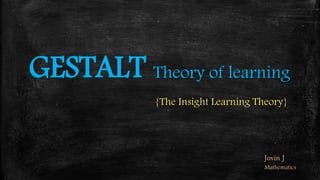
Gestalt theory
- 1. GESTALT Theory of learning {The Insight Learning Theory} Jovin J Mathematics
- 2. GESTALT Psychology According to the Gestalt psychologists — notably Max Wertheimer (1880-1943), Wolfgang Khler (1887-1967) and Kurt Koffka (1886- 1941) — certain features in visual perception are universal. We can Say that they are innate, they don’t have to be taught. Such theories are known as sensual theories. Sensual theories are of a lower order of thinking than perceptual theories. Perceptual theories take into account the meaning we attach to what we see. Gestalt theory proposes that we see by forming light and dark objects, edges and contours into a whole image without thinking about it. The statement, The whole is different from the sum of its parts, sums up the way we recognize figures and whole forms instead of just a collection of simple lines, curves and shapes.
- 3. The whole is different from the sum of its parts Although this famous logo for the World Wildlife Federation is really just a collection of shapes, we make sense of it through the Gestalt principles of figure-ground and closure. Main concept -The learning takes place through Insight
- 4. Insight It means sudden grasping of the solution for a problematic situation, a flash of understanding which comes to us all on a sudden. It is the sudden awareness or perception of the essential relationship in a situation.
- 6. Factors Influencing Insight ▪ Experience ▪ Intelligence ▪ Learning Situation ▪ Initial Efforts ▪ Repetition and Generalization
- 7. Gestalt laws of learning [ perception laws of learning ] Gestalt psychologists have outlined fundamental and universal principles, sometimes called “laws,” of perceptual organization Law of similarity Law of proximity Law of closure Law of continuity
- 8. Law of Similarity (also known as Invariance) The human eye tends to build a relationship between similar elements within a design. Similarity can be achieved using basic elements such as shapes, colors, and size. The fact that we link things that are similar and treat them like a distinct group is the law of similarity For e.g.; Take a look at the letters seen here: g g g g g g h h h h h h i i i i i i j j j j j j You would probably describe what you see as 4 rows of letters instead of 6 columns of letters because we tend to group similar things into whole sets - that's the law of similarity.
- 9. Law of Proximity The Law of Proximity states that objects that are near or 'proximate' to each other tend to be grouped together. It is part of the Gestalt Laws of Perceptual Organization and Gestalt psychology, which was founded by Max Wertheimer
- 10. Law of Closure The principle of closure states that we tends to close the open edges of a figure to make the stimulus configuration complete.
- 11. Law of Continuity The law states that we link individual elements so that they form continuous pattern that makes sense to us
- 13. Educational Implications The teacher should present the subject matter as a whole to facilitate insight learning. Use of bling fumbling and mechanical trail and error should be minimized. While planning the curriculum ,Gestalt principles should be given due consideration. A particular subject should not be treated as the mere collection of isolated facts. It should be closely integrated into a whole. Teacher should motivate the child by arousing his interest and curiosity.
- 14. It has made learning an intelligent task requiring mental abilities instead of automatic response to specific stimuli. So the learner must be given opportunities for using his mental abilities. Learning task must be properly graded according to the intellectual development of the learner. In order that the learner will be able to solve problems by insight, meaningful learning, learning by understanding and reasoning must be encouraged in the school. since insight depends upon the previous experience of the learner, the teacher must help learner recall what has been learned earlier, and relate them to the new learning.
- 15. Trail and Error learning Insight Learning Learning is a matter of connection between a stimulus and a response. Learning is the organisation of experience into cognitive structure. It recognizes practice as the basis of learning. It recognizes an individual’s insight as the basis of learning. It gives important place to one’s past experience in learning. According to insight theory, past experience is not necessary for learning. Learning under conditions of reinforcement is the key concept of trail and error theory. Perception is the key concept of insight learning theory. Parts are fundamental. Whole is primary. The foundation stone of trail and error learning is practice and interest. The foundation stone of insight learning is intelligence. Emphasis on trail and error, drill and reinforcement. Emphasis on understanding and insight. It is best for reaction type learning and habit information. It is most suited for concept learning and problem solving.